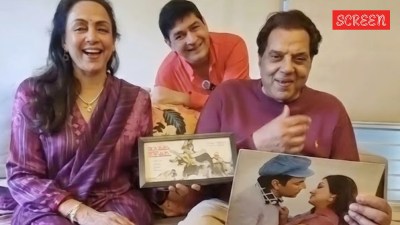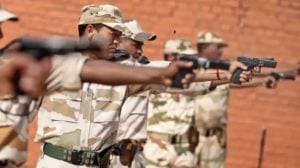On MP border, cattle just dropping dead
In Sheopur, the cattle are dying in thousands. Several drought-stricken villages in the Kharral block of this district bordering Rajasthan m...

In Sheopur, the cattle are dying in thousands. Several drought-stricken villages in the Kharral block of this district bordering Rajasthan may soon have no livestock left. The cause of the cow, which both Chief Minister Digvijay Singh and the BJP have been championing loudly, is already lost here. There has been no response from the government or the Sangh Parivar.
The villages near Kharral are inhabited primarily by the Sahariya tribals, along with a sprinkling of Yadavs and Jatavs. These tribals have been hit the worst by the drought which is now in its third year. It claimed Sahariya lives last year in Chharch Shivpuri, 30 km east from here, and in Baran Rajasthan, 50 km south-west.
This tragedy for the tribals, who own little but their cattle, could have been easily foreseen. Deprived of their grain stock for the past two years, they are at the moment completely dependent on government relief work. The jungles have wilted and there is no fodder, and where they have water to drink, the cattle are starving.
Which is why Suresh, a Jatav from Kharral, won the 8216;theka8217; for dead cattle in Panvada village though the Rs 60,000 he shelled out was three times the amount paid last year. 8216;8216;I got the contract on April 15. Since then I have skinned 110 cattle. The number this year is far higher and that8217;s why there was so much competition at the auction.8217;8217;
And the cattle are dying faster than Suresh can lift. In Panvada and the nearby villages of Silpuri and Sarsunwari, carcasses lie scattered on the outskirts of the villages and the stench is all-pervasive. Here the sun is unbearable even in the morning, and by noon the temperature even in the shade is well over 40. Herds of emaciated cattle huddle together is this shade, inching towards death. 8216;8216;The ones that sit down are not going to get up,8217;8217; says a villager.
Kunwarian Sahariya in Panvada owned two bullocks, a cow and a calf. 8216;8216;They are all dead. During the harvest I had gone to Supar the irrigated area of Shivpuri district and returned last month. Now there is government relief work and I depend on the government relief work. Yes, chara fodder is available at a reduced rate of Rs 2 per kg, but when we can8217;t even find food for ourselves, where is the question of purchasing fodder?8217;8217; he asks.
Rattalu is the Sahariya sarpanch of Panvada. 8216;8216;I had a cow, a bull and a calf but they are all dead. Everyone here depends on relief work. We had a tank built and now work on a road is on.8217;8217; For each 10215;10 sq-ft pit, a person gets 10 kg of wheat. According to Rattalu, most famlies put together would be getting to work on at the most 10 such pits a month. Further ahead in Silpuri, Avtar Sahariya has the same tale. 8216;8216;There is no work to be had anywhere this year. We have no money and even the baraats in this wedding season are fed roti with salt. We used to collect some greens, fruits and herbs to supplement our diet but the jungle has dried up.8217;8217; The Yadavs own large herds and they are faring no better. Near Silpuri, Ramavati was leading some of her cattle to water. 8216;8216;We are the biggest owners of cattle in these villages. We owned 200 of the best heads of the Marwari breed of cattle. Eighty have died,8217;8217; she says.
In Panvada, Sitaram Yadav has seen close to a hundred perish. He and his brothers own 18 bigah of land but they have not got any crops for the past two years. Like the Sahariyas, most of the landowning Yadavs too now depend on the relief work. Panvade is just off the main raod connecting Shivpuri to Sheopur. In the interiors of the district lies the village of Sarsunwari. Here even the government relief work has not started. Sarpanch Udua8217;s wife is more vocal than him. 8216;8216;Pashu ke baad, manush ka number aa jaige after the cattle, it will be the turn of humans. Ask Collector Hari Singh Shekhawat and he points to work being done in other parts of the district.
8216;8216;We have provided free fodder for gaushalas in the town as the Chief Minister wanted. We are looking after cattle that has been driven across the border from Rajasthan and the death of a few cattle elsewhere is a small price to pay. We are providing fodder at concessional rates.8217;8217; When told that no Sahariya can afford these rates and perhaps the government needs to do more, he says this is a decision to be taken in Bhopal.
- 01
- 02
- 03
- 04
- 05































